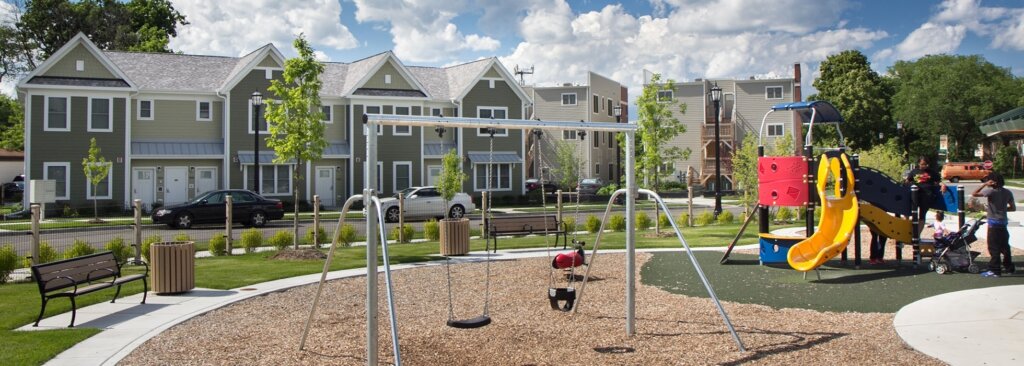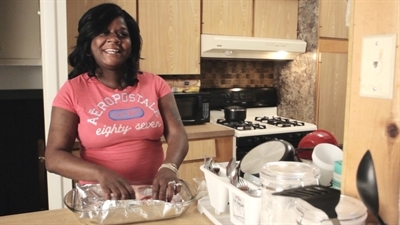Regional Housing Initiative

Creating opportunity in Chicagoland—and around the nation
To expand housing options for low-income families, MPC is working with regional public housing authorities and governments at all levels to pool resources in support of developing new affordable rental homes in communities with good schools, transit access and jobs.
Issue
Housing shortage perpetuates, concentrates poverty
Though metropolitan Chicago’s housing market remains weak, the availability of affordable homes in communities with good jobs, transit access and quality schools continues to fall far short of demand. The recession hit suburbs and cities indiscriminately and accelerated a nationwide phenomenon: Today, more of the nation’s poor live in the suburbs than in cities. A 2013 analysis by the Brookings Institution shows that the number of suburban households living in poverty in Chicagoland grew by 99 percent between 2000 and 2011. Nearly 50 percent of families in this region pay more than 30 percent of their household income on housing and utilities, according to the American Community Survey.
Chicagoland has grappled for decades with concentrated poverty and a lack of housing choices for low-income families. Rising housing costs coupled with the recent unemployment crisis served to further concentrate affordable housing and poverty in neighborhoods with high crime and poor access to jobs, transit and amenities. Municipal zoning and development regulations that discourage multifamily housing development and declining federal housing financing have further exacerbated this trend, making it difficult to build in some of the region’s highest opportunity communities. The results: far too many families living in precarious housing conditions, growing regional inequality, a dysfunctional housing market with few options for developers or renters, and hampered regional economic growth, public safety and health.
Solutions
Since its foundation in 1934, MPC has been committed to integrating quality homes affordable to families at a range of incomes—including very low-income households—into communities with transportation options, job opportunities and quality schools. To address the region’s growing housing challenges, MPC, Illinois Housing Development Authority (IHDA) and eight regional housing authorities created a collaborative called the Regional Housing Initiative (RHI) to support affordable and mixed-income housing developments in opportunity areas. Since 2002, RHI partners have worked with the Metropolitan Mayors Caucus, suburban employers and a range of local and regional stakeholders to overcome a number of housing and community development challenges through several promising strategies.

Since 2002, the public housing authorities participating in RHI have pooled a portion of their available rental assistance vouchers to provide long-term support for the rehabilitation or construction of multifamily, affordable rental homes in opportunity communities across the region. That means RHI can adapt to the changing housing market and economic climate more flexibly than current federal funding flows permit. For example, despite the growing need for affordable housing in the suburbs, the Chicago and Cook County Housing Authorities receive higher levels of voucher subsidies than the suburban housing authorities. By allowing eight housing authorities to pool their resources, RHI created a mechanism through which a suburban housing development can receive subsidies even if the local housing authority lacks resources.
While RHI addresses development challenges, an MPC survey of regional public housing authorities showed that most rent voucher holders are not moving into opportunity communities, even as public housing authorities spend $1 million each year to facilitate such moves. In an era of declining federal resources for housing and poverty interventions, in 2011 the U.S. Dept. of Housing and Urban Development (HUD) awarded RHI a vote of confidence and $1 million to pilot new strategies to help families. For the past three years, the Chicago region has been using a regional waiting list for families who want to move into RHI developments and providing education on mobility and portability to support families leaving high poverty, distressed communities for opportunity communities across the region.
RHI has created 406 apartments in 28 successful developments around the region.
RHI’s success can be replicated in other regions around the country. Here are the essential ingredients to success.
Benefits
The pooling and transferring of subsidies has allowed RHI to support 406 apartments in 28 developments in 19 quality communities around the region. The Chicago and Cook County Housing Authorities see clear benefits in contributing vouchers to other communities in the region because waiting list families from all eight geographies are offered expanded housing opportunities. This shared list, combined with the voucher portability pilot, is helping more low-income families find homes in attractive communities across the region. It also removes some of the administrative inefficiencies and barriers experienced by participating housing authorities.
Learn more
Collaborators
BRicK Partners, LLC
Chicago Housing Authority
City of Chicago Dept. of Community Development
Chicago Housing Authority
DuPage Housing Authority
Housing Authority of Cook County
Housing Choice Partners
Illinois Housing Development Authority
Joliet Housing Authority
Lake County Housing Authority
McHenry County Housing Authority
Oak Park Housing Authority
RAND Corporation
Waukegan Housing Authority
Partnership for New Communities
U.S. Dept. of Housing and Urban Development
